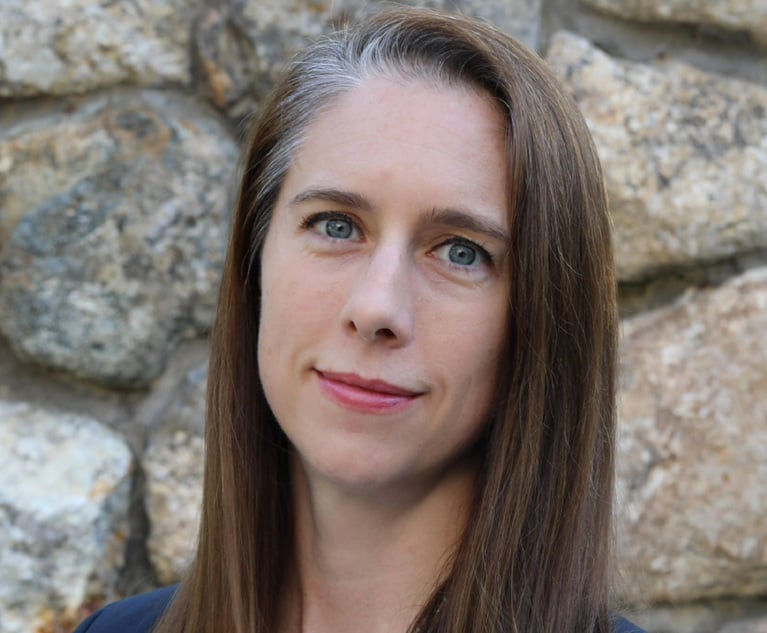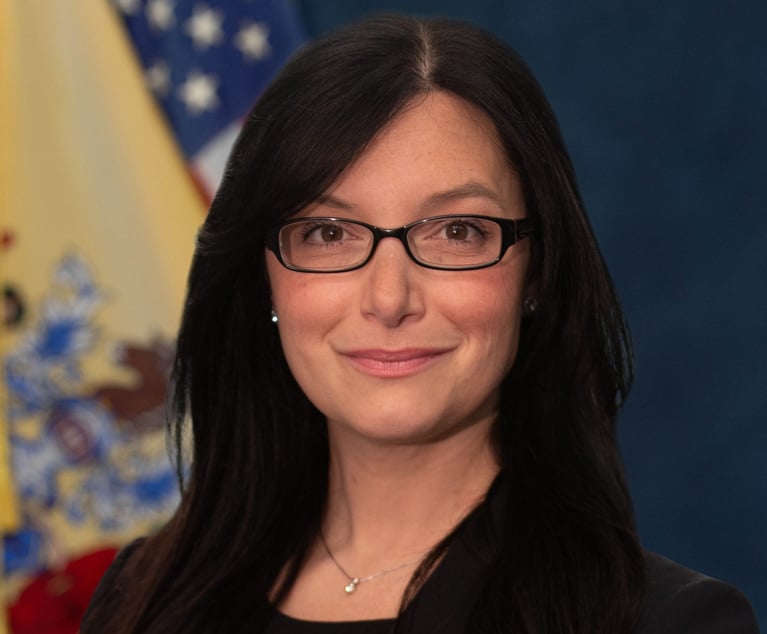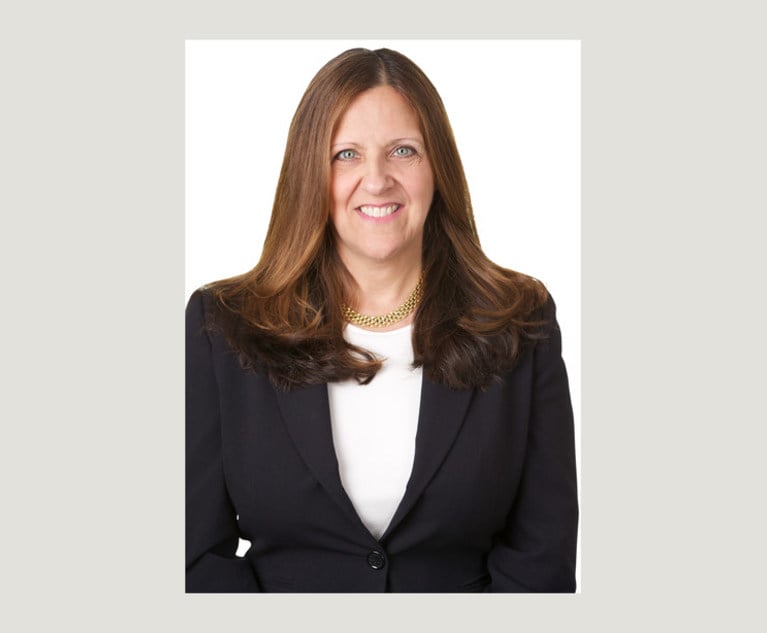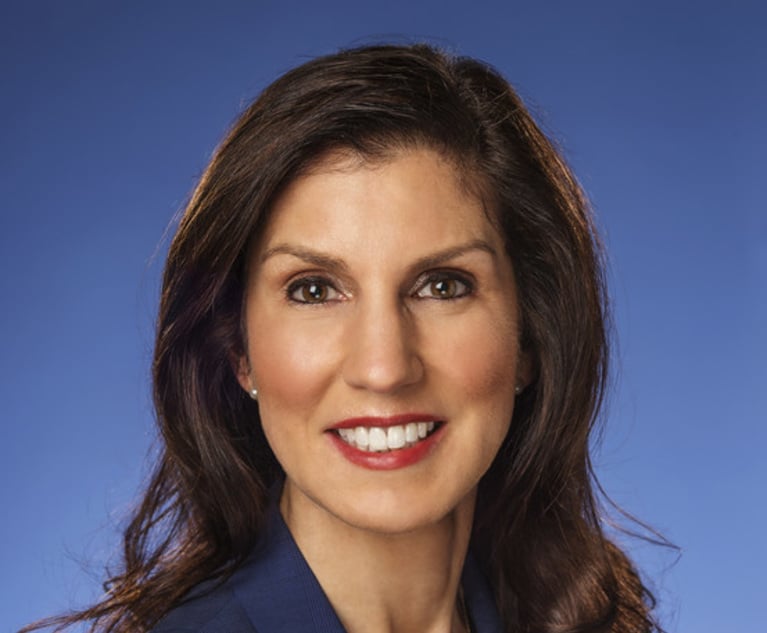 Emily Goldberg of Paul, Weiss, Rifkind, Wharton & Garrison
Emily Goldberg of Paul, Weiss, Rifkind, Wharton & GarrisonPaul Weiss Pro Bono Counsel Goldberg Finds 'No Room For Ego'
"During challenging times, the only way to effectively lawyer is to organize beyond our traditional, insular approaches."
June 10, 2019 at 05:51 PM
4 minute read
Emily Goldberg is pro bono counsel at Paul, Weiss, Rifkind, Wharton & Garrison, and has coordinated the firm's pro bono efforts, and collaborations with pro bono counsel at other firms and organizations, to assist immigrants dealing with family separation, deportation proceedings and other issues. Much of her work (and her residence) are in New Jersey. In 2018, Goldberg joined the ACLU-NJ in an action filed in New Jersey federal court on behalf of Indonesian Christians facing deportation, obtaining a temporary injunction. She helped reunite a Honduran man detained in New Jersey with his daughter after 93 days spent separated. Goldberg, who is in leadership at Volunteer Lawyers for Justice in Newark, has spent her career doing civil rights and public interest work, including previously at Gibbons and McCarter & English.
Law practice is often a team endeavor. What has been your experience with teamwork in the law?
During challenging times, the only way to effectively lawyer is to organize beyond our traditional, insular approaches. Over the past two years, as the rule of law has been threatened in previously unimaginable ways, successful responses have required mobilization of the private and public interest bars in unprecedented numbers, strategically, and across firm and even geographic boundaries. I could not fulfill my role in responding to large-scale legal problems without building partnerships both within and beyond the confines of my own firm. There is simply no room for ego.
What types of work done at law firms and other organizations are commonly underappreciated?
Often, newsworthy pro bono work implicates the rights of groups, or novel issues of law. I “grew up” litigating these kinds of impact cases as a younger lawyer, and it remains a passion. But as I matured, I began to appreciate that changing one life for the better is just as important, just as profound, as fighting systemic injustice. These more discrete cases are also the best training ground for our young lawyers to discover the potential of their developing professional skills. I keep on my desk mementos from individual clients to remind me of the power that pro bono work has to change someone's life for the better—or even save it.
What can professional groups, legal publications and others do to better shed light on lawyers and law practices doing important work that's under the radar?
Pro bono is often recognized in a set aside, at a special publication or annual awards event. While such recognition is valuable, this suggests that pro bono is a separate part of the practice of law, wholly different from the paid work that most lawyers do every day. If pro bono work were recognized in the ordinary course, just as commercial work is—for example, in weekly or monthly publications—it could help correct the message that pro bono is something we do “on the side,” and should instead be understood as integral to every lawyer's practice.
What must firms do to ensure that lawyers remain engaged with pro bono work, their communities and their families?
It is vital that law firm leaders send the unambiguous message that pro bono is encouraged, valued and expected. When support for pro bono comes from the top, and is not undermined by conflicting messages, lawyers feel empowered to get involved and remain engaged. I have seen the power of this commitment from the chair of my firm, Paul, Weiss. I also believe that the development of a professionalized pro bono practice, led by experienced lawyers, makes a tremendous difference in the quality and strategic focus of the work that firms do in the pro bono space.
How are the business and profession of law changing, and are New Jersey lawyers well-positioned for the future?
For too long, there was a sense that New Jersey's female lawyers “opted out” after having children. In this narrative, women made a choice: in or out. Today, as clients expect law firms to better reflect our society, New Jersey firms need to provide women meaningful tools to succeed at home and work. As a mother with significant professional responsibility, I appreciate that my firm ensures that I can both “show up” for my children and be dedicated to my work, including through a flex-time program that is fair and effective.
This content has been archived. It is available through our partners, LexisNexis® and Bloomberg Law.
To view this content, please continue to their sites.
Not a Lexis Subscriber?
Subscribe Now
Not a Bloomberg Law Subscriber?
Subscribe Now
NOT FOR REPRINT
© 2024 ALM Global, LLC, All Rights Reserved. Request academic re-use from www.copyright.com. All other uses, submit a request to [email protected]. For more information visit Asset & Logo Licensing.
You Might Like
View All
For Lawyers, the 'Work' of Making an Impact Does Not Have to Happen in a Courtroom. Laura E. Sedlak Says

Doing the Right Thing in the Pursuit of Justice Requires Guts, Says Lyndsay Ruotolo

One Can be Most Impactful When Their Pursuits Are Driven by Their Concerns and Passions, Says Sherilyn Pastor

As a Lawyer, You Have a Powerful Way to Make an Impact, Says Mary Frances Palisano
Trending Stories
Who Got The Work
Michael G. Bongiorno, Andrew Scott Dulberg and Elizabeth E. Driscoll from Wilmer Cutler Pickering Hale and Dorr have stepped in to represent Symbotic Inc., an A.I.-enabled technology platform that focuses on increasing supply chain efficiency, and other defendants in a pending shareholder derivative lawsuit. The case, filed Oct. 2 in Massachusetts District Court by the Brown Law Firm on behalf of Stephen Austen, accuses certain officers and directors of misleading investors in regard to Symbotic's potential for margin growth by failing to disclose that the company was not equipped to timely deploy its systems or manage expenses through project delays. The case, assigned to U.S. District Judge Nathaniel M. Gorton, is 1:24-cv-12522, Austen v. Cohen et al.
Who Got The Work
Edmund Polubinski and Marie Killmond of Davis Polk & Wardwell have entered appearances for data platform software development company MongoDB and other defendants in a pending shareholder derivative lawsuit. The action, filed Oct. 7 in New York Southern District Court by the Brown Law Firm, accuses the company's directors and/or officers of falsely expressing confidence in the company’s restructuring of its sales incentive plan and downplaying the severity of decreases in its upfront commitments. The case is 1:24-cv-07594, Roy v. Ittycheria et al.
Who Got The Work
Amy O. Bruchs and Kurt F. Ellison of Michael Best & Friedrich have entered appearances for Epic Systems Corp. in a pending employment discrimination lawsuit. The suit was filed Sept. 7 in Wisconsin Western District Court by Levine Eisberner LLC and Siri & Glimstad on behalf of a project manager who claims that he was wrongfully terminated after applying for a religious exemption to the defendant's COVID-19 vaccine mandate. The case, assigned to U.S. Magistrate Judge Anita Marie Boor, is 3:24-cv-00630, Secker, Nathan v. Epic Systems Corporation.
Who Got The Work
David X. Sullivan, Thomas J. Finn and Gregory A. Hall from McCarter & English have entered appearances for Sunrun Installation Services in a pending civil rights lawsuit. The complaint was filed Sept. 4 in Connecticut District Court by attorney Robert M. Berke on behalf of former employee George Edward Steins, who was arrested and charged with employing an unregistered home improvement salesperson. The complaint alleges that had Sunrun informed the Connecticut Department of Consumer Protection that the plaintiff's employment had ended in 2017 and that he no longer held Sunrun's home improvement contractor license, he would not have been hit with charges, which were dismissed in May 2024. The case, assigned to U.S. District Judge Jeffrey A. Meyer, is 3:24-cv-01423, Steins v. Sunrun, Inc. et al.
Who Got The Work
Greenberg Traurig shareholder Joshua L. Raskin has entered an appearance for boohoo.com UK Ltd. in a pending patent infringement lawsuit. The suit, filed Sept. 3 in Texas Eastern District Court by Rozier Hardt McDonough on behalf of Alto Dynamics, asserts five patents related to an online shopping platform. The case, assigned to U.S. District Judge Rodney Gilstrap, is 2:24-cv-00719, Alto Dynamics, LLC v. boohoo.com UK Limited.
Featured Firms
Law Offices of Gary Martin Hays & Associates, P.C.
(470) 294-1674
Law Offices of Mark E. Salomone
(857) 444-6468
Smith & Hassler
(713) 739-1250






